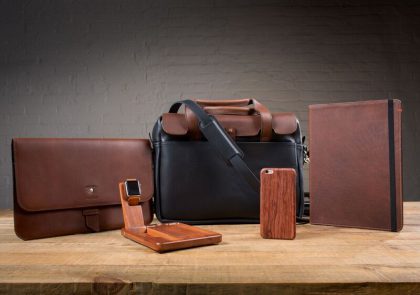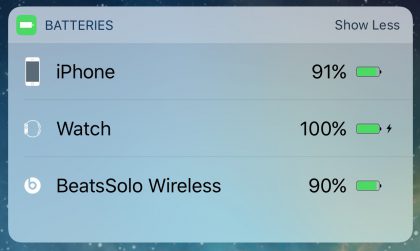August 22, 2016
Written by Jim Dalrymple
Pad and Quill has partnered with The Loop to offer you a chance to win a $700 Back to Work giveaway. One winner will receive a Luxury Briefcase, Leather Ipad pro case, Woodline case for the Iphone, and a Classic leather band for the Apple Watch.” Sign up for your chance to win!

Written by Jim Dalrymple
Zakk is the reason I picked up the guitar again after a few years away from playing. He is an incredible guitarist—acoustic and electric— and having met him a number of times, he is a great person. I learned how to play almost every song he released, just so I could see how he did chord progressions and timing.
Written by Shawn King
Wired:
“Americans are fed up,” says Federal Communications Commission boss Tom Wheeler. “Robocalls are a scourge. It’s the number one complaint that we hear from consumers on a daily basis.”
To address those complaints, Apple, Alphabet (you know—the folks who own Google), AT&T, Comcast and other tech companies are joining an FCC task force charged with ending the scourge of automated pre-recorded telemarketing calls.
Whether they’ll succeed is another matter entirely.
When I lived in the States, I was appalled at the ridiculously huge number of robocalls I got on a regular basis. It’s getting just as bad here in Canada. I hope these companies can band together to find an effective solution to this problem.
Written by Shawn King
Recode:
Although mathematician Katherine Johnson was honored last year with the Presidential Medal of Freedom, few know just how integral she was to the U.S. space race.
Fortunately, many more soon will. Her story is being made into the movie “Hidden Figures,” which tells the tale of how Johnson and several other black women played a pivotal role in helping the U.S. send men into space and bring them back safely.
Johnson, who worked at NASA and its predecessor agency from 1953 until 1986, was responsible for calculating flight plans for astronauts from Alan Shepard and the Mercury Project through the Space Shuttle. In the process, she broke down all manner of barriers and stereotypes about the role black women in particular could play in math and science.
I’m looking forward to seeing this movie about these amazing women. The trailer looks good.
Written by Shawn King
Atlas Obscura:
The greatest gimmick of all time might have been the creation of light beer—a swill that is widely derided by snobs like me, but nonetheless defines the modern beer industry.
These days, light beers make up seven of the 10 most popular brands of U.S. beer, with Bud Light far outpacing everyone else. It probably says a lot about light beer that the man widely considered the inventor of low-calorie swill was a biochemist.
I’m one of those beer snobs. I’ve never had a “Lite” beer that was worth the price.
Written by Shawn King
Inessential:
We at Q Branch just released the final version of Vesper. It does one crucial thing: it allows you to export your notes and pictures. See the new Export section in the sidebar.
Sync will be turned off Aug. 30 at 8pm Pacific. We’ll destroy all the data, and neither we nor anyone else will be able to recover it.
The app will be removed from the App Store on Sep. 15. Until then, starting now, it’s free — since you can’t create new sync accounts, and it wouldn’t be fair to charge new users if they can’t sync.
This has been in the tea leaves for a while. Simmons has a few more details about the shutdown of the app here.
Written by Shawn King
The New York Times:
The company, which is based in San Francisco, has in recent months held talks or made approaches to sell itself to companies including General Motors, Apple, Google, Amazon, Uber and Didi Chuxing, according to a dozen people who spoke on the condition of anonymity because the discussions were private.
While Tim Cook has said the company is looking to make major acquisitions, on the face of it, buying Lyft doesn’t seem to make sense, given their investment in Didi Chuxing. More than likely, any talent or technology they would get from a Lyft purchase is already available to them through Didi.
Pandora will be streaming Metallica’s concert from U.S. Bank Stadium in Minneapolis at 9:00 pm CT time tonight.
P.S. WTF Apple? Time to pay attention to some music other than Pop or Rap.

Written by Jim Dalrymple
The launch isn’t until 2018, but it’s good that people are working on a standard now.
August 19, 2016
Written by Shawn King
CBC:
In the final two kilometres of the 50km race, Dunfee lost stride after Hirooki Arai of Japan bumped him during a collision and went on to cross the finish line third, in a time of three hours 41 minutes 24 seconds — 14 seconds ahead of Dunfee, who improved his Canadian record time to 3:41:38.
Athletics Canada appealed the result post-race, and Dunfee was awarded the bronze. But shortly thereafter, Japan successfully countered the appeal and had the decision reversed, to give Arai the bronze medal.
When I watched the race live, I was yelling at my TV, “He pushed him out of the way!” When I heard later Dunfee had been awarded the bronze, I cheered. Now that Dunfee has had his belatedly given Bronze taken away, I’m amazed. I honestly don’t think I would have reacted as magnanimously or with as much class as Dunfee has over this.
Written by Jim Dalrymple
I always regretted not getting one of these.
Written by Jim Dalrymple
“The need to place cameras on hanging truss over the field of play in venues with no catwalks or roof access led us to working with several companies to find a way hang a camera and then be able to pan, tilt, focus and transmit images in real-time,” said David Phillip, a photographer for The Associated Press who set up the AP’s robotic and remote cameras for the 2016 Olympics. “The process is on-going as we continue to work on improving the performance and design.”
There has been some outstanding images and video from the Olympics.
Written by Jim Dalrymple
Pandora has the best music algorithm in the business—the choice of the next song is almost always spot on. The app is easy to use and the service always works. I’m a paying subscriber of Pandora and I can’t wait for the on-demand service to hit. I’ll definitely be subscribing to that.
Written by Shawn King
International Photography Hall of Fame and Museum:
Today, in honor of the International Photography Hall of Fame and Museum’s 50th anniversary and World Photo Day, IPHF announced its 2016 class of Photography Hall of Fame inductees. Eight photographers and photography industry visionaries who embody the spirit, artistry and innovation of modern photography have been selected for induction.
Steve Jobs was an American inventor and entrepreneur who cofounded Apple and led it to become the world’s most innovative company. Steve helped create products that revolutionized the creative world and became essential tools for designers, filmmakers, music producers and photographers. Passionate about photography both in his work and personal life, his most profound contribution to the artistic community and the world is the iPhone which, in less than a decade, has changed both the art of photography and the industry around it.
The Hall is also inducting documentary filmmaker Ken Burns, 20th century photographer Ernst Haas, Photoshop co-creators John and Thomas Knoll, photographer Annie Leibovitz, digital printing pioneer Graham Nash, and photographer Sebastião Salgado.
Written by Jim Dalrymple
More than 30 major technology companies are joining the U.S. government to crack down on automated, prerecorded telephone calls that regulators have labeled a “scourge.”
Yes, please. I don’t know much about the technology with robocalls or how advanced it is. I’m just wondering if this is going to be a whack-a-mole situation.
iOS 10 beta 7 was released today. I haven’t seen any of the other operating system updates yet. If you have a previous beta version installed, just go to Settings > General > Software Update to download the new version.
Written by Jim Dalrymple
Thanks to Igloo for sponsoring The Loop this week. Igloo is an intranet you’ll actually like. It’s 100% cloud-based, so you’ll always have the latest version and it can be accessed from any device, anywhere. It’s time to simplify work and keep people more connected than ever before.
Written by Shawn King
CBC:
The countdown is on. Tragically Hip fans across Canada are prepping for the Man Machine Poem tour finale in the band’s hometown of Kingston, Ont., on Saturday.
Emotions of Hip devotees have been high since the iconic band revealed that frontman Gord Downie had been diagnosed with an aggressive, incurable form of brain cancer.
This is going to be a bittersweet concert. From all indications, Downie, the Tragically Hip’s lead singer and soul of the band, is putting on amazing performances on his last tour.
If you connect to a Bluetooth device on your iOS device, you may have noticed a little battery icon just to the right of the Bluetooth icon in the status bar. Here’s a pic of mine:

Not all devices support this Bluetooth battery reporting, but most Bluetooth headsets do. According to Macfixer, this dates back to the original Apple iPhone Bluetooth Headset.
But what happens if you have more than one Bluetooth device connected? How can you tell the battery levels of your various devices? Turns out, iOS 10 has your back.
- On your iOS 10 home screen, drag to the right to show your list of widgets.
- Scroll down to find the Batteries widget. If you don’t have it installed, scroll down to the bottom and tap the Edit button, then scroll to find Batteries, tap the plus icon (to the left) to add it, then tap Done (upper right corner).
Your Batteries widget reports the charge of your iPhone and all connected devices. By default, Batteries only shows your Apple gear. To show more, tap Show More on the right side of the Batteries widget status bar.
Here’s a picture of my Batteries widget:

You can do this in iOS 9 as well, but the interface is just a bit more complex. Here’s a link to a writeup that’ll talk you through it.
I find this really useful. Enjoy, and please pass this along.
Written by Dave Mark
Juli Clover, MacRumors:
Apple appears to be making a slight branding change to its retail business, dropping the “Store” moniker when referring to its Apple Store locations. Apple has already made the change online, and all of its store pages now refer to stores by names like “Apple Union Square” or “Apple Valley Fair” or “Apple The Grove,” instead of “Apple Store, Valley Fair” or “Apple Store, The Grove.”
It’s a change that appears to have started rolling out with the launch of the newer Apple Stores, like the Union Square location in San Francisco. Apple has always referred to that store as just Apple Union Square, and over the course of the last few days, the company has updated all of its retail store webpages to remove the “Store” branding. What was once “Apple Store, Fifth Avenue,” for example, is now just “Apple Fifth Avenue.”
This seems a logical path for Apple, adhering to their simplify-where-possible strategy and their adherence to minimalism. A bit like their move from Apple Computer, Inc. to Apple Inc. This also addresses the internationalization issue. Apple will always be Apple, but the word store does not cross language barriers in the same way as the Apple brand by itself.
That said, I still think about going to the local Apple Store. It’ll take me some time to make the switch to heading over to Apple.
Written by Dave Mark
Andrew Leavitt:
Are you familiar with “The Trolley Problem?” It’s an ethical thought experiment with a central moral dilemma.
An observer must decide whether to switch a trolley track when either choice will result in negative consequences for innocent bystanders. If he intervenes more lives are saved [practical] but he has then taken an active role in who lives or dies [immoral]. If he leaves the switch alone he is moral but more lives are certainly lost. There is no unequivocal “right choice” – especially as the scenario becomes more complex.
Interesting post that touches on Aasimov’s three laws of robotics and MIT’s moral machine web experiment.
The first 10 second of this video are the end result. The rest of the video shows how it was done. I love the mechanics behind this shot, the fact that some of it was hand designed and 3D printed, and the obvious care that went into this. Bravo!
Written by Dave Mark
Reuters:
Australia’s anti-trust regulator on Friday said it would not grant the country’s three biggest banks interim approval to collectively negotiate with Apple Inc to install their own electronic payments applications on iPhones.
Australia’s three biggest banks, including the number one lender National Australia Bank (NAB), last month lodged a joint application seeking permission to negotiate as a bloc from the Australian Competition and Consumer Commission (ACCC).
The ACCC said that its decision not to grant the banks the interim ruling was not indicative of whether the full ruling, expected in October, would be successful or not.
And:
Apple, which operates its own Apple Pay mobile wallet, does not allow third-party electronic payment apps to be loaded onto to the hugely popular smartphones. The banks are seeking to be able to negotiate jointly for access to Apple’s phones without themselves being accused of violating anti-competition law.
The three Australian banks contend that while Apple allows apps on iPhones using other commonplace technology, such as Wi-Fi and Bluetooth, restricting the technology through which mobile wallets function – known as Near Field Technology – constitutes anti-competitive behaviour.
Again, this is an interim decision. The full ruling will occur in October. Hard to say whether this is in any way a good indicator.
Written by Dave Mark
Joe Rossignol, writing for MacRumors:
The latest numbers from research firm Gartner reveal that the smartphone industry continues to be a virtual two-horse race between iOS and Android. The operating systems combined for a record 99.1% worldwide market share in the second calendar quarter of 2016, compared to 96.8% in the year-ago period.
That’s amazing to me. Just a bit more than nine years ago, neither company (Apple for iOS, Google for Android) had a horse in this race. And now, everyone else is gone or, at best, window dressing.
Written by Dave Mark
Twitter’s blog:
Earlier this year, we announced we had suspended more than 125,000 accounts since mid-2015 for violating our longtime prohibition on violent threats and the promotion of terrorism and shared the steps we are taking as a company to combat this content. Since that announcement, the world has witnessed a further wave of deadly, abhorrent terror attacks across the globe. We strongly condemn these acts and remain committed to eliminating the promotion of violence or terrorism on our platform.
While our work is not done, today we are announcing that we have suspended an additional 235,000 accounts for violating our policies related to promotion of terrorism in the six months since our February 2016 post. This brings our overall number of suspensions to 360,000 since the middle of 2015. As noted by numerous third parties, our efforts continue to drive meaningful results, including a significant shift in this type of activity off of Twitter.
Read the blog post for details. Combine this with Twitter’s work on a quality filter setting and you get the sense that there’s real movement here, a focus on some of the deeper problem areas for Twitter.
Written by Dave Mark
Christian Zibreg, writing for iDownloadBlog:
Various editions of iOS 9 are currently installed on 87 percent of iPhone, iPad and iPod touch devices, a one-point gain versus a month ago.
And:
By comparison, Google’s official stats have Android 6.0 Marshmallow powering 15.2 percent of smartphones and tablets, with the two-year-old Lollipop (5.0-5.1) OS found on more than one-third of Android hardware (35.3 percent).
Here’s a link to Apple’s official dashboard that measures adoption.
August 18, 2016
Written by Jim Dalrymple
Travis Kalanick has to get Uber’s bet on self-driving cars right.
“It starts with understanding that the world is going to go self-driving and autonomous,” he told Business Insider in an interview.
“So if that’s happening, what would happen if we weren’t a part of that future? If we weren’t part of the autonomy thing? Then the future passes us by basically, in a very expeditious and efficient way.”
As much as I may not like autonomous cars, from a business perspective, it’s hard to argue with his reasoning.
Written by Jim Dalrymple
The source of the delay is that current cellular chips consume too much battery life, reducing the product’s effectiveness and limiting user appeal, according to three of the people. Apple has begun studying lower-power cellular data chips for future smartwatch generations.
This is an incredibly difficult problem, but anything that negatively affects battery life will be a non-starter for a lot of users. Most days, I have plenty of battery life remaining when I go to bed, but I wouldn’t want to be in a situation where I was running out of power early in the day.




